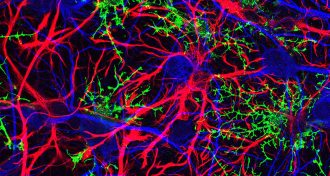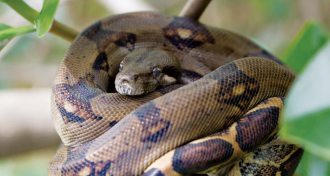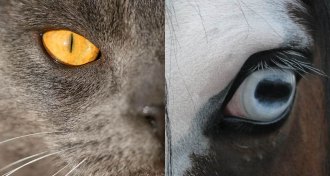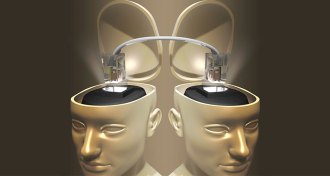Life
Sign up for our newsletter
We summarize the week's scientific breakthroughs every Thursday.
-
 Neuroscience
NeuroscienceHints of how the brain “sees” dreams emerge
Nerve cells that make sense of visual input keep chugging away during REM sleep, suggesting that these cells may help a sleeper “see” dreams.
-
 Health & Medicine
Health & MedicineFish oil may counter schizophrenia
Three months of omega-3 fatty acids protects against psychosis for years, a small study suggests.
-
 Neuroscience
NeuroscienceRethinking which cells are the conductors of learning and memory
Brain cells called glia may be center stage when it comes to learning and memory, recent research suggests.
-
 Animals
AnimalsBiologists aflutter over just where monarchs are declining
Citizen science data fuel debate over whether weed control ruined monarch habitat and whether the butterflies are failing to reach their Mexican winter refuge.
By Susan Milius -
 Animals
AnimalsSimple change to fishing nets could save endangered whales’ lives
Making industrial fishing ropes weaker would reduce humpback and right whale bycatch by almost three-quarters
-
 Neuroscience
NeuroscienceA voyage into Parkinson’s disease, led by patient and journalist
Jon Palfreman’s Brain Storms explores Parkinson’s disease in the past, present and future.
-
 Animals
AnimalsBoa suffocation is merely myth
Boa constrictors don’t suffocate prey; they block blood flow, says a new study that shatters a common myth about the snakes.
By Susan Milius -
 Animals
AnimalsPower of pupils is in their shape
Horizontally or vertically stretched pupils may provide predators and prey with visual advantages.
-
 Neuroscience
NeuroscienceBrain scans hint at reasons for stress-eating
Moderate stress changes brain behavior in ways that may lead to poor food choices.
-
 Animals
AnimalsGibbons have been disappearing from China for centuries
Gibbons are now found in only a small area of southwestern China. But they once thrived across much of the country, records show.
-
 Neuroscience
NeuroscienceClaim of memory transfer made 50 years ago
Scientist’s claims of transferred memories were more fiction than fact.
-
 Genetics
GeneticsAncestral humans had more DNA
A new genetic diversity map marks where humans have gained and lost DNA.